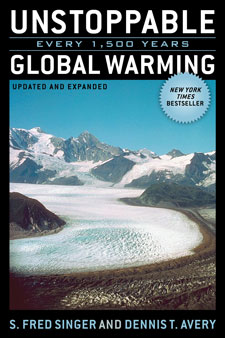This book’s thesis is that global warming is happening but that it is a natural process. It cites a lot of scientific literature in support of its claim. I'm not able to review that literature " much of it is technical and in periodicals which only university libraries might have. But what I can do is look at its arguments from a layperson's view.
Its basic contention is that there is a cycle in the world's temperature which runs about every 1400 years and that cycle is governed by solar activity. The authors give some evidence of solar activity but a quick google search reveals that there are a lot of conflicting views about this " and the authors don't refer to those conflicting views.
 And that shows one of the problems with this book, it's a polemic, not a balanced review of the evidence and the science though the authors would probably say they need to be polemical to counteract the general consensus " which they say is a political and journalistic consensus not a scientific one.
And that shows one of the problems with this book, it's a polemic, not a balanced review of the evidence and the science though the authors would probably say they need to be polemical to counteract the general consensus " which they say is a political and journalistic consensus not a scientific one.
The authors belittle other scientists. S. Fred Singer who is one of the two authors is a respected scientist. He invented one of the basic tools for weather satellites, he has won awards and medals, he has been an advisor to several governments. But to read his book all those who disagree with him are alarmists, biased (p135) hysterical and so on.
The next problem " and to me it's fundamental one " is that it tries to do too much. At the same time as saying there is evidence that solar activity creates the cycle and that the cycle is 1400 years (which if you accept their science is at least arguable; and may well be correct " perhaps the "jury is still out') the authors support their position of the cycles by referring to the three known peaks in temperatures in northern Europe, one in the latter days of the Roman Empire, the second the Medieval Warm Period (about 1000-1300AD) and the present period. But there's only been 1600 years since the end of the Roman Empire (5th Century AD) and so there should only, according to the author's main thesis, have been one complete cycle.
In short the evidence they cite doesn't " at least to my mind " fit the theory. Mind you it doesn't altogether fit the global warming theory either, and if the book were simply a refutation of global warming then the Medieval Warm Period might be a good argument " or at the very least evidence that needs to be dealt with. But that's not what the book is about.
Again the authors try to have it both ways. They say " and cite evidence for " increased rain and a damper climate in Africa during the Roman Empire " parts of Libya grew wheat " saying that was a benefit of warmer weather but then point to increased rain in Europe in the Little Ice Age of the 16-17th Century. Perhaps both are true, but how both fit into their theory of cycles isn't at all clear.
But the most surprising claim was that the warmer weather is actually good.
Warmer weather should, according to the writers, increase agricultural production (tell that to my cousins in the Riverina) and reduce disease.
The authors give some examples of where that has happened in the past.
It's a contrarian's argument, one that is only touched on in the book but perhaps could be more developed
The authors also take issue with alternative energy sources " or at least wind and solar generation, but that's really off the main topic.
In all it's an uneven book, one that fudges by trying to use data that doesn't fit its theory, a book that starts a number of side issues but never deals with them properly and a book that doesn't, in my mind, establish what it sets out to.


























